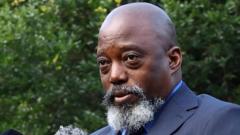The Senate's decision to strip Joseph Kabila of his immunity marks a significant step toward possible prosecution for alleged treason associated with support for rebel groups in the eastern region of the country.
Kabila's Immunity Lifted: Pathway to Prosecution in DR Congo

Kabila's Immunity Lifted: Pathway to Prosecution in DR Congo
Former President Joseph Kabila faces treason charges as his legal immunity is revoked in the Democratic Republic of Congo.
The Democratic Republic of Congo’s Senate has officially lifted the immunity of former President Joseph Kabila, thus allowing for his prosecution on serious treason charges. This decision came amidst accusations from authorities linking Kabila to the M23 armed group, which has gained control over several towns in the eastern mineral-rich territories of the nation.
The Senate declared that there is a “substantial body of documents, testimony, and material facts” connecting Kabila to the rebel group, heightening the gravity of the situation. Kabila, who served as president from 2001 to 2019, has so far remained silent on these allegations and did not present himself to the Senate to defend his actions.
A significant majority of nearly 90 senators voted in favor of lifting Kabila's immunity, with only five opposing the motion. The Senate Speaker, Jean-Michel Sama Lukonde, confirmed the authorization for prosecution. Although Kabila, aged 53, has been living in exile in South Africa since 2021, he stated that he plans to return to DR Congo to assist in resolving the ongoing conflict in the east.
In previous reports, Kabila was claimed to have returned to Goma—one city currently under M23 control—but these claims were dismissed by his party, the People's Party for Reconstruction and Democracy (PPRD). The party itself was previously banned by authorities for what was described as an "ambiguous attitude" towards the conflict.
Justice Minister Mutamba has also indicated the intention to seize Kabila's assets, urging him to return and "face justice." Analysts suggest that the trial of Kabila could exacerbate the instability within the region, as DR Congo has been grappling with the M23 rebellion since 2012. Meanwhile, Kabila's party labeled the prosecution as "pure theatre," criticizing it as a tactic to distract the public from the country's pressing issues.
Kabila's presidency began at the young age of 29 following the assassination of his father, Laurent Kabila. Despite aiding the rise of current President Félix Tshisekedi, relationships between their parties soured, culminating in the termination of their coalition in December 2020. Remarkably, Kabila still wields considerable influence within his political party and among ruling coalition members, potentially threatening Tshisekedi's administration.
Efforts to negotiate peace between DR Congo and Rwanda, which denies allegations of supporting the M23, seem to be on the horizon, following a preliminary agreement reached in Washington last month to address ongoing hostilities. In the past, the military court in DR Congo has sentenced several M23 leaders to death in absentia for treason.
The conflict involving M23 and governmental forces has led to widespread displacement, with hundreds of thousands of civilians fleeing their homes in recent months, accentuating the urgent need for resolution in the region.





















